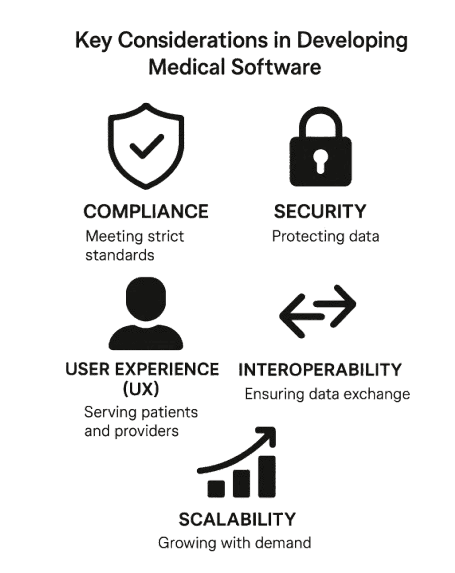2025 Healthcare software development is revolutionizing the way in which clinics, hospitals and digital health companies provide patient care. Developing medical software is central to innovation within the medical sector – from patient portals to artificial intelligence diagnostics. With rapid digital transformation in healthcare, providers are now turning more to custom software to address real world challenges since no one size fits all – thus enhancing outcomes and patient experience, streamline processes and make data more accessible.
Whether it's managing patient records, facilitating telemedicine or improving clinical decision making, software development for healthcare is the solution. This is more than merely getting rid of paper and manual procedures. Rather, it's about making smarter systems that result in improved care. Healthcare software today enables everything—from predictive analytics to remote monitoring so providers can respond more quickly and effectively in any situation. In this blog we’ll dive into how healthcare software development is changing care, why it matters more than ever and what goes into building reliable, compliant and scalable solutions.
What Is Healthcare Software Development?
Healthcare software development is the process of designing, constructing, and maintaining digital systems that assist in clinical, operational, and administrative processes in medicine. It's not coding apps for the sake of it—it's about building tools that make life-critical decisions, keep sensitive information safe, and advance healthcare.
It combines rich technical knowledge with rigorous regulatory requirements. Developers collaborate with physicians, compliance specialists, and data scientists to develop platforms that need to deliver under stress. Each system—whether it's handling patient information, monitoring lab tests, or managing a blood transfusion—needs to be speedy, reliable, and secure. Whether you're building medical software for hospitals, startups, or government health systems, the objective remains the same: build effective, efficient tools that enhance care and safeguard patients.
Why Healthcare Software Development Matters in 2025?

Healthcare has come a long way—and that’s a good thing. It has now totally changed the healthcare process that was once used to be. Healthcare software development is not merely about converting paper records into digital form anymore—it's about creating strong, intelligent systems that enable real-time decision-making, tailored treatments, and anticipatory care delivery. Whether you’re building enterprise platforms or medical software— the goal is the same: smarter, faster and effective patient care.
But why does this matter now, in 2025? Because the challenges facing healthcare are evolving rapidly. We’re seeing a surge in chronic illnesses, more frequent viral outbreaks, and an aging population that needs long-term support. COVID-19 exposed just how vulnerable outdated systems can be—delayed responses, fragmented data, and overwhelmed infrastructures. Today’s software must not just manage care but anticipate it. That involves incorporating predictive analytics to alert for emergencies before they reach crisis levels, monitoring public health trends, and modulating treatment plans in real time.
Leading digital health companies are now infusing AI and machine learning into every layer of their platforms. This allows providers to predict complications, spot anomalies early, and customize care plans based on real-time data—not guesswork. Interoperability has shifted from an ideal to a necessity now, which enables seamless data exchange between hospitals, labs, pharmacies, and wearable devices.
Remote care,what was once a backup, is now the focus. Telehealth and RPM technologies extend care to underserved and rural populations, while also helping with long-term management of chronic diseases—all without requiring a hospital visit.
In short, healthcare software development is important in 2025 because the world has changed. The need for faster, more intelligent, and more responsive care has arrived—and software is how we deliver it. It's not just about simplifying systems anymore; it's about saving lives, anticipating the next emergency, and providing data-driven, connected, and ready-for-anything care.
Types of Healthcare Software
Healthcare software comes in many forms, each built to solve specific problems inside hospitals, clinics, labs, and even patient homes. Each software type plays a key role in making care delivery more efficient, connected, and data-driven
Below are the most common types of health IT solutions used across the industry:
Electronic Health Records (EHRs):
Centralized digital charts that store medical history, labs, medications, and clinical notes.
Practice Management Systems:
Handle scheduling, billing, insurance claims, and day-to-day clinic operations.
Hospital ERP Systems:
Comprehensive platforms that integrate multiple back-office functions such as inventory, finance, procurement, HR, and supply chain—all within a single system.
Telemedicine Platforms:
Secure video, messaging, and remote exam tools for virtual patient visits.
Prescription Software:
Streamlines the prescribing process, connects with pharmacies, and reduces medication errors.
Remote Patient Monitoring (RPM):
Tracks vital signs and chronic conditions in real time from home or mobile.
Patient Blood Management (PBM) Systems:
Support clinical decisions to optimize blood use, improve safety, and reduce unnecessary transfusions.
Blood Bank Information Management Systems:
Blood Bank Information Management Systems Manage donor data, blood inventory, cross-matching, and traceability within transfusion services.
Medical Imaging and Diagnostic Software:
Supports AI-based image reading and integrated radiology workflows.
Lab Information Systems (LIS):
Automate test orders, results reporting, and sample tracking in diagnostic labs.
Key Considerations in Developing Medical Software
Building healthcare platforms isn’t just about writing code—it’s about aligning with clinical needs, staying compliant, and planning for long term performance. Whether you’re building medical software for startups or enterprise providers, these are the factors that determine success or failure.

Compliance
Medical software means meeting strict standards like HIPAA, GDPR and FDA guidelines to protect patient safety and privacy.
Security
Systems must be built with end to end encryption, secure user authentication and real time threat detection from day one.
User Experience (UX)
Design must serve both patients and providers—simple interfaces, fast access and zero room for confusion in critical workflows.
Interoperability
Software must integrate with EHRs, labs, devices and other platforms using HL7, FHIR and custom APIs to ensure data exchange.
Scalability
From small clinics to national networks, health IT solutions need infrastructure that can scale without breaking performance or compliance.
Top Healthcare IT Consulting Companies in 2025
Below are some of the top healthcare software development companies in the world, known for driving innovation, reliability, and real-world impact in medical technology.
ScienceSoft
Founded: 1989
Headquarters: McKinney, Texas, USA
Overview: ScienceSoft offers end-to-end engineering of compliant healthcare software and advanced analytics solutions. Recognized as a leader in the healthcare IT services market, they have a strong presence across the US, KSA, UAE, and Europe.
Vention
Founded: 2002
Headquarters: New York, USA
Overview: Vention specializes in custom healthcare software development, offering services like medical invoicing, digital payments, and virtual consultation tools. Their solutions are tailored for clinics, hospitals, and healthcare startups.
Innowise
Founded: 2007
Headquarters: Warsaw, Poland
Overview: Innowise delivers innovative digital health applications, focusing on AI-driven diagnostics and electronic health records (EHR). They cater to a global clientele, emphasizing compliance and efficiency.
Codal
Founded: 2009
Headquarters: Chicago, USA
Overview: Codal offers comprehensive healthcare IT solutions, integrating modern design with robust backend systems. Their expertise spans telemedicine platforms, patient portals, and health analytics tools.
Health Catalyst
Founded: 2008
Headquarters: Utah, USA
Overview: Health Catalyst specializes in healthcare data analytics and software development medical platforms that help providers improve clinical outcomes and reduce costs. They are Trusted by major health systems like Mayo Clinic and Intermountain Healthcare.
IT Craft
Founded: 2001
Headquarters: New York, USA
Overview: IT Craft specializes in developing medical software with features like appointment scheduling, patient data management, and virtual consultations. Their solutions prioritize user experience and compliance.
LeewayHertz
Founded: 2007
Headquarters: San Francisco, USA
Overview: LeewayHertz offers blockchain-integrated healthcare solutions, focusing on data security and interoperability. Their services include developing health IT solutions that streamline operations and enhance patient care.
Cerner Corporation (Now Oracle Health)
Founded: 1979
Headquarters: North Kansas City, Missouri, USA
Overview: Cerner is a global leader in health information technology, providing solutions that optimize clinical and administrative workflows. Their platforms are widely adopted across hospitals and health systems.
Zaavia
Founded: 2012
Headquarters: Karachi, Pakistan
Overview: Zaavia is a rising name in custom healthcare software development, building intelligent solutions for health systems, pharmacies, and digital health startups worldwide. Their flagship product, PANACEA, is a Blood Bank Management System used by over 75 hospitals and labs in Pakistan and the Middle East. Zaavia's expertise extends to Digital Document Management Systems, enhancing efficiency and compliance in healthcare operations.
Change Healthcare
Founded: 2007
Headquarters: Nashville, Tennessee, USA
Overview: Change Healthcare delivers data-driven solutions that enhance clinical decision-making and streamline revenue cycle management. Their platforms support interoperability and patient engagement.
Top Healthcare Software Development Companies in Pakistan (2025)
Below are some of the top healthcare software development companies in Pakistan, that are well known for driving innovation in the field of medical tech space within the region.
Zaavia
Specialization: Zaavia provides top healthcare software solutions in Pakistan, including Blood Bank Information Management Systems, Patient Blood Management Systems, and Electronic Document Management Systems. They are also recognized as Best Custom Software in Pakistan 2024 by TechBehemoth.
Tech Stack: Proficient in Java, Azure, React Native, C++, MongoDB, JavaScript and AWS.
Notable Clients: Indus Hospital (Karachi), Prince Muhammad Bin Abdul Aziz Hospital (KSA), Saudi German Hospital (Madinah, Dammam ) KSA , Makkah Regional Labs KSA, Liaquat National Hospital (Karachi), and Shaikh Zayed Hospital (Quetta).
Systems Limited
Specialization: Enterprise digital transformation, including healthcare systems like Electronic Medical Records (EMR), Hospital Information Systems (HIS), and data analytics.
Tech Stack: Expertise in Microsoft technologies, Java, React, Azure, and Power BI.
Notable Initiatives: Sponsored sessions on healthcare innovation in Pakistan, collaborating with industry and academia to drive technological advancements in the healthcare sector.
10Pearls
Specialization: Custom digital product development for health tech startups and enterprises, with a focus on AI and machine learning integrations.
Tech Stack: Proficient in React, Node.js, Flutter, Python, and cloud services.
Notable Projects: Developed telehealth services with fully automated software deployment processes, enhancing customer satisfaction and accelerating service delivery.
Cubix
Specialization: Mobile health applications, wearable integrations, and gamified wellness platforms.
Tech Stack: Expertise in Swift, Kotlin, Unity, React Native, Laravel, Firebase, and AWS.
Notable Achievements: Recognized by GoodFirms as the top mobile app development company in Pakistan, with a diversified portfolio including health and fitness applications.
CureMD
Specialization: Comprehensive healthcare solutions, including Practice Management, Electronic Health Records (EHR), and billing solutions.
Tech Stack: Utilizes .NET, Java, and proprietary frameworks.
Notable Clients: Serves a range of clients from small practices to large organizations, with a strong focus on AR management and reducing claim denials.
Choosing the Right Development Partner
Choosing the right partner can make or break your healthcare software project. First focus on domain expertise—does the vendor really understand healthcare workflows, regulations and patient needs? Secondly, knowledge of compliance standards like HIPAA and GDPR is essential to avoid costly mistakes.
Look for someone who offers unparalleled customer support as well. Reliable support and ongoing maintenance means your software will evolve with changing requirements and stay secure over time. Also consider partners who offer transparent communication and fast response times.
Zaavia stands out by combining healthcare domain expertise with a proven track record of building scalable, compliant solutions like their Blood Bank Information Management System. Their client-first approach and dedication to innovation make them a trusted choice for health systems and startups alike.
- If you are ready to start your journey with us, Book a Free Demo today!
Conclusion
The future of healthcare software development has already arrived—and it's changing more rapidly than ever. From AI-based diagnostics to real-time wearable integration and data analytics, these technologies are no longer science fiction—they're actively transforming patient care on a daily basis. Healthcare technology that anticipates, adjusts, and interoperates effortlessly is the new gold standard for quality and efficiency.
Now is the time to elevate your digital health infrastructure. Investing in the proper healthcare software isn't merely about being up to date—it's about being ahead of the game. Intelligent, scalable solutions simplify workflows, enable clinicians, and engage patients. The result? Better outcomes, higher satisfaction, and a healthcare experience that delivers.